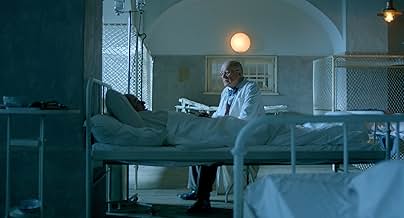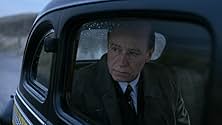A period in the life of diplomat and politician Jan Masaryk, who was the son of Czechoslovakia's founder, served as the Central-European country's minister of foreign affairs and has been br... Read allA period in the life of diplomat and politician Jan Masaryk, who was the son of Czechoslovakia's founder, served as the Central-European country's minister of foreign affairs and has been brutally killed by Russian secret service in 1948.A period in the life of diplomat and politician Jan Masaryk, who was the son of Czechoslovakia's founder, served as the Central-European country's minister of foreign affairs and has been brutally killed by Russian secret service in 1948.
- Awards
- 20 wins & 8 nominations total
Katya Hazel Boirand
- Barmanka
- (as Katya Boirand)
- Director
- Writers
- All cast & crew
- Production, box office & more at IMDbPro
Storyline
Did you know
- TriviaJeremy Irons was originally considered for the part of Neville Chamberlain, eventually played by Paul Nicholas.
- Quotes
Neville Chamberlain: Your manners really are appalling.
- ConnectionsFeatured in Show Jana Krause: Episode dated 22 February 2017 (2017)
Featured review
Picture about a kind-hearted, jolly man with a complicated soul. Such a movie would Jan Masaryk deserve, unfortunately, he did not get. Not even a pack of twelve Czech Lions means that Julius Sevcik's rendering of the Masaryk's story is extraordinary.
The only thing which cannot be denied to this film is rather decent cinematography. However, it is necessary to add that either the rest of the pictures participating in the competition for the Czech Lion Awards are, as for photography, not poor at all. Nevertheless, the academics decided to award Masaryk and their choice is basically above reproach. It is also not possible to more seriously object to awarding Masaryk for Best Actor in a Supporting Role, Stage Design, Sound, Music, Costume Design, Makeup and Hairstyling and nor for Film Editing to some extent. Because none of that was utterly bad.
Worse is the case of awarding the film for Best Director and Screenplay. The thing is that even a relatively observant and well-educated viewer can have an issue with understanding frequent switching from one time line to another. Authors also place incomprehensibly great emphasis on scenes in which, in fact, nothing important is happening and only music is creating a semblance of action in them. Moreover, some of them are overly long.
Really odd is the fact that the Czech Lion Award for Best Actor in a Leading Role has been given to Karel Roden. No matter how absolutely great he was in his other roles, in this case he can definitely not dazzle any viewer who knows at least something about Jan Masaryk, saw him on photos or heard him speak. Roden's performance cannot even convince such a viewer that he is watching Jan Masaryk on the screen and not just a disguised actor. Viktor Fischl, who had the honour to work by the side of Jan Masaryk on the Czech Ministry of Foreign Affairs in London during WWII, wrote this in his book about him: 'barely to find a person who would be more kind to anyone he met. His smiling joviality could persuade every man after the first ten minutes that he may call Masaryk just Jan and consider him to be a friend for life and death.' However, it seems as if Roden's portrayal of Jan Masaryk is lacking this kindness and joviality and the actor replaced it with bitterness and some kind of timidness instead. Of course, Jan Masaryk was a complicated personality, which was torn in its own way, but somehow differently torn than Roden's character. It is really a great pity that a film about a Czech history figure did not totally manage to depict this figure.
It is hard to say whether there is to blame only the actor for the way of the portrayal of the leading character, because also the director and screenplay have a huge influence on that. Exactly this trio creates an impression of the whole film. An impression which is somehow wishy-washy, mainly because of the fact that the plot of the film is ending already during the Second World War. The rest of the life of Jan Masaryk is set on the screen in just a few sentences of the plain text before the ending credits. The story is basically lacking both the background and the end. Yet this all is being replaced with the scenes of Jan Masaryk dancing and making love which probably according to the authors represent important and from the picture uncuttable part of the life story of Tomá Garrigue Masaryk's son. Who would care about Jan Masaryk's childhood, path to maturity, development of the relationship to his father, realization of the duty to fatherland and dealing with the post war situation, while instead of that he can watch Karel Roden wiggling to the sound of saxophone.
The authors of Masaryk shot a movie that the viewers want to watch, which is also reflected in the number of the Czech Lion Awards it has been given. There is also an award for the Best film among them. At the end of the projection my eyes watered. Not because I was so deeply moved neither because of the realization how much the authors managed to bungle this story. It was because I was really sad, that nobody in the Czech republic is able to shoot beautiful, kind, but yet not glamorizing film about Czech history. A film which will not concentrate on the things which the viewer needs, but what needs and deserves our fatherland.
The only thing which cannot be denied to this film is rather decent cinematography. However, it is necessary to add that either the rest of the pictures participating in the competition for the Czech Lion Awards are, as for photography, not poor at all. Nevertheless, the academics decided to award Masaryk and their choice is basically above reproach. It is also not possible to more seriously object to awarding Masaryk for Best Actor in a Supporting Role, Stage Design, Sound, Music, Costume Design, Makeup and Hairstyling and nor for Film Editing to some extent. Because none of that was utterly bad.
Worse is the case of awarding the film for Best Director and Screenplay. The thing is that even a relatively observant and well-educated viewer can have an issue with understanding frequent switching from one time line to another. Authors also place incomprehensibly great emphasis on scenes in which, in fact, nothing important is happening and only music is creating a semblance of action in them. Moreover, some of them are overly long.
Really odd is the fact that the Czech Lion Award for Best Actor in a Leading Role has been given to Karel Roden. No matter how absolutely great he was in his other roles, in this case he can definitely not dazzle any viewer who knows at least something about Jan Masaryk, saw him on photos or heard him speak. Roden's performance cannot even convince such a viewer that he is watching Jan Masaryk on the screen and not just a disguised actor. Viktor Fischl, who had the honour to work by the side of Jan Masaryk on the Czech Ministry of Foreign Affairs in London during WWII, wrote this in his book about him: 'barely to find a person who would be more kind to anyone he met. His smiling joviality could persuade every man after the first ten minutes that he may call Masaryk just Jan and consider him to be a friend for life and death.' However, it seems as if Roden's portrayal of Jan Masaryk is lacking this kindness and joviality and the actor replaced it with bitterness and some kind of timidness instead. Of course, Jan Masaryk was a complicated personality, which was torn in its own way, but somehow differently torn than Roden's character. It is really a great pity that a film about a Czech history figure did not totally manage to depict this figure.
It is hard to say whether there is to blame only the actor for the way of the portrayal of the leading character, because also the director and screenplay have a huge influence on that. Exactly this trio creates an impression of the whole film. An impression which is somehow wishy-washy, mainly because of the fact that the plot of the film is ending already during the Second World War. The rest of the life of Jan Masaryk is set on the screen in just a few sentences of the plain text before the ending credits. The story is basically lacking both the background and the end. Yet this all is being replaced with the scenes of Jan Masaryk dancing and making love which probably according to the authors represent important and from the picture uncuttable part of the life story of Tomá Garrigue Masaryk's son. Who would care about Jan Masaryk's childhood, path to maturity, development of the relationship to his father, realization of the duty to fatherland and dealing with the post war situation, while instead of that he can watch Karel Roden wiggling to the sound of saxophone.
The authors of Masaryk shot a movie that the viewers want to watch, which is also reflected in the number of the Czech Lion Awards it has been given. There is also an award for the Best film among them. At the end of the projection my eyes watered. Not because I was so deeply moved neither because of the realization how much the authors managed to bungle this story. It was because I was really sad, that nobody in the Czech republic is able to shoot beautiful, kind, but yet not glamorizing film about Czech history. A film which will not concentrate on the things which the viewer needs, but what needs and deserves our fatherland.
Details
- Release date
- Countries of origin
- Official sites
- Languages
- Also known as
- Ян Масарик
- Production companies
- See more company credits at IMDbPro
Box office
- Gross worldwide
- $2,000,121
- Runtime1 hour 54 minutes
- Color
Contribute to this page
Suggest an edit or add missing content



































